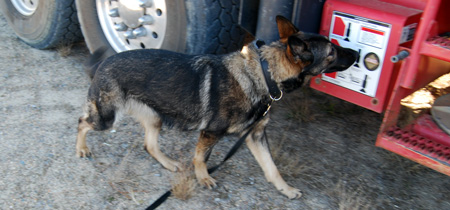
Luca looks for illegal drugs on a large commercial vehicle.
What’s special about dogs?
Compared to other drug-detection techniques, such as random drug testing, personal searches or security cameras, why are dogs so effective at finding drugs?
The answer may be right behind the dog’s nose: its brain.
We humans have brains that are dominated by a large visual cortex, but our best friends’ brains instead have a large olfactory cortex. Dogs have as many as 225 million smell-sensitive receptors; their olfactory bulb is 40 times larger than the one we humans have.
According to some estimates, the sense of smell in some breeds of dogs may be from 1,000 to 10,000 times greater than ours.
Canine Drug Detection
Over the centuries, we humans have become good at putting our best friends to work. Their jobs have ranged from herding livestock to hunting to controlling rats, assisting blind people and hauling loads.
Dogs provide assistance to people with physical or mental disabilities, they’re able to sense when an epileptic is about to have a seizure and they can detect whether a person has cancer.
Their talent and in our case, their special training, make them the perfect candidate to become a detection dog (also known as a sniffer dog) for detecting drugs and contraband. Along with their trained handlers, they are doing their part to keep homes, schools and workplaces secure and free of drugs.

